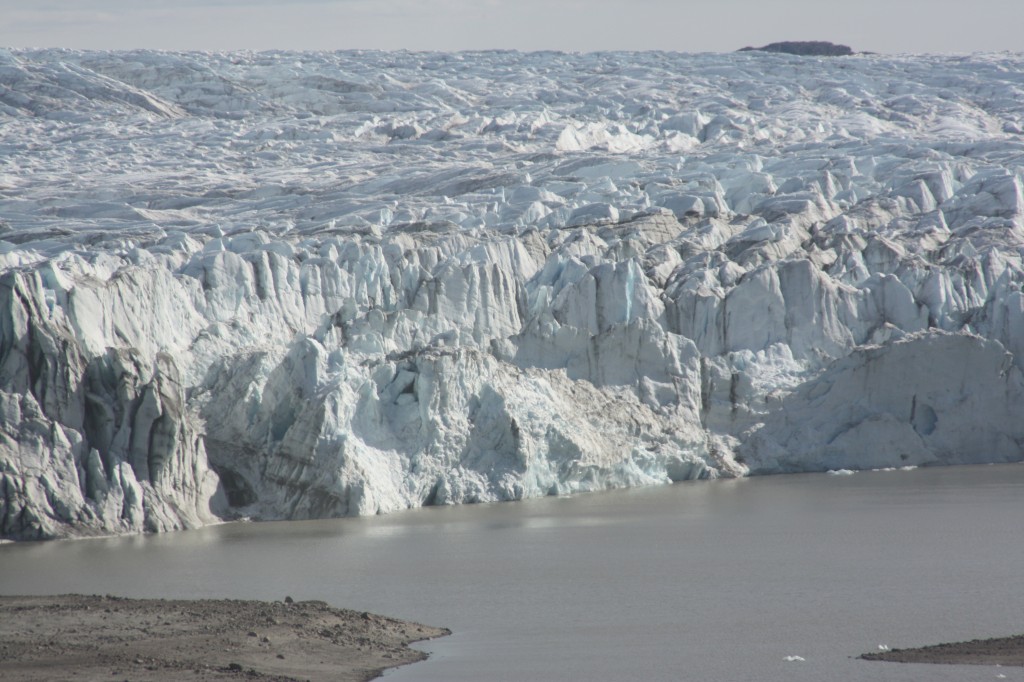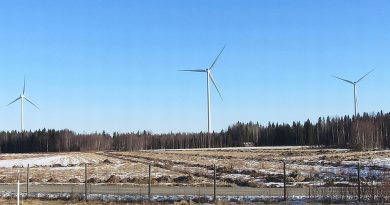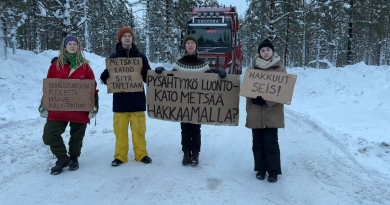Ice-Blog: Greenland’s icecap losing stability
 Catching up on the last few weeks of icy news after a spring holiday, my eye was caught by an item by Tim Radford from the Climate News Network, dated April 13th.
Catching up on the last few weeks of icy news after a spring holiday, my eye was caught by an item by Tim Radford from the Climate News Network, dated April 13th.
I quote: “Greenland is losing ice from part of its territory at an accelerating rate, suggesting that the edges of the entire ice cap may be unstable”. This caught my attention not just because anything relating to Greenland tends to do that, but because the development could have major significance for the future world climate and sea level- and because it doesn’t seem to have made its way into the mainstream media at a time when sensitivity to the issue should have been high after the IPCC report.
The Greenland ice sheet is the largest terrestrial ice mass in the northern hemisphere. Radford draws attention to a study in Nature Climate Change by Shfaqat Khan from the Technical University of Denmark and colleagues, which indicates that the ice sheet could be melting faster than previously thought. This would mean Greenland’s contribution to sea level rise has been under-estimated (once again!), and oceanographers may need to think again about their projections.
The scientists used more than 30 years of surface elevation measurements of the entire ice sheet to discover that overall loss is accelerating. Previous studies had identified melting of glaciers in the island’s south-east and north-west, but the assumption had been that the ice sheet to the north-east was stable, Radford writes:
“It was stable, at least until about 2003. Then higher air temperatures set up the process of so-called dynamic thinning. Ice sheets melt every Arctic summer, under the impact of extended sunshine, but the slush on the glaciers tends to freeze again with the return of the cold and the dark, and since under historic conditions glaciers move at the proverbial glacial pace, the loss of ice is normally very slow.”

But with global warming, Greenland’s southerly glaciers have been in retreat and one of them, Jakobshavn Isbrae or Sermeq Kujalleq, is now flowing four times faster than it did in 1997. I first reported on this during a trip to Greenland in 2010, and have presented various new studies on it here on the Ice Blog since.
The new research by the Danish-led team considers changes linked to the 600 kilometre-long Zachariae ice stream in the north-east, using satellite measurements. It has retreated by some 20 kilometres in the last DECADE, whereas Sermeq Kujalleq has retreated about 35 kms in 150 years. The Zachariae stream drains around one-sixth of the Greenland ice sheet, and because warmer summers have meant significantly less sea ice in recent years, icebergs have more easily broken off and floated away, which means that the ice stream can move faster. “North-east Greenland is very cold. It used to be considered the last stable part of the Greenland ice sheet,” said one of the team, Michael Bevis of Ohio State University in the US, in an interview with the Climate News Network.
“This study shows that ice loss in the north-east is now accelerating. So now it seems that all of the margins of the Greenland ice sheet are unstable.”
The scientists used a GPS network to calculate the loss of ice. Glacial ice presses down on the bedrock below it: when the ice melts, the bedrock rises in response to the drop in pressure, and sophisticated satellite measurements help scientists put a figure on the loss of ice. They calculate that between April 2003 and April 2012, the region was losing ice at the rate of 10 billion tons a year.

“This implies that changes at the margin can affect the mass balance deep in the centre of the ice sheet,” said Dr Khan. Sea levels are creeping up at the rate of 3.2 mm a year. Until now, Greenland had been thought to contribute about half a mm. The real figure may be significantly higher, according to the report.
This is a very worrying development, but it seems to me it did not get a lot of public attention. This brings me back to the question of the discrepancy between what we know about the impacts of climate change and the widespread lack of political and consumer action. (See my article Denial or Disconnect: Why don’t we act on climate change?)
Are people sticking their heads in the sand (or melting snow)? Have we just been assured so many times that the Greenland ice sheet will never melt that we don’t sit up and take notice? Is it too far away in time and space to bother us? Are too many people giving up and resigning themselves to the fact that climate change is inevitable? Is it just so much easier to hold on to the status quo instead of having to make changes to our 21st century lifestyles?




